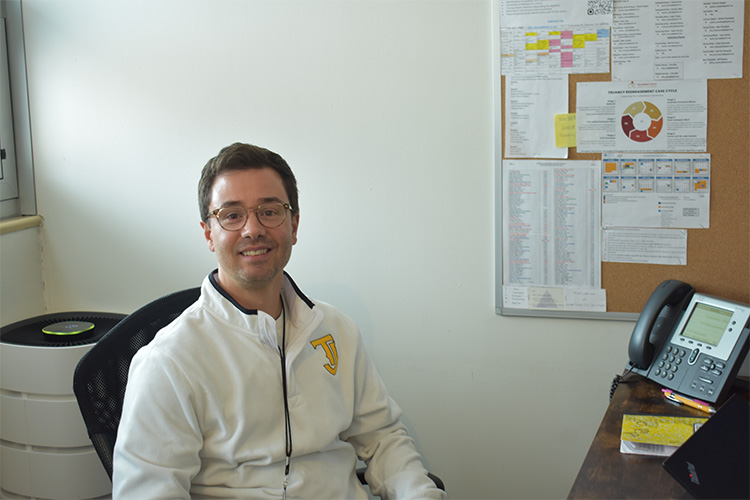
Mr. Anderson makes everyday life for students easier. photo by Ben Scherer
Jeremy Anderson is a school counselor at TJ who helps the community flow smoothly.
Jeremy Anderson has been a part of the counseling team at Thomas Jefferson for 11 years. His personal passion is helping students plan their futures and providing them with mental health support. This aspiration led Anderson to becoming a school counselor and an integral part of the TJ community. However, Anderson never originally imagined that he would become a counselor of any kind.
Anderson’s journey started when he completed his undergraduate degree at Colorado State University (CSU) getting a bachelor’s degree in Liberal Arts – Social Sciences. After completing his undergraduate program, he joined the AmeriCorps program – a federal agency that allows volunteers to serve their communities – for a year in Philadelphia. Anderson’s location for service happened to take place in schools. After the AmeriCorps program, he then went into the hospitality field, working at the Grand Hyatt Hotel in Denver where he ran big events such as weddings. Following this job, he was then employed at Goodwill in the school department then went to the University of Colorado Denver (UCD) to get his master’s degree in counseling. At this point in his journey, Anderson had decided to become a counselor.
Anderson believes that Thomas Jefferson is the perfect sized school; it’s “…big enough to have everything go on and be able to get involved with everything you want to, but small enough that you kind of get a chance to know everybody.” He explained that TJ provides the opportunity to get to know all of the students and staff, which is not the case at every high school. The diversity of the Spartan community is another aspect that Anderson appreciates within Thomas Jefferson, as he gets to hear from a variety of students, each with different backgrounds.
Anderson finds meaning in his job because being a counselor allows him to help students accomplish their goals. He loves that he can have a positive impact, making students’ lives easier as he helps them with the college application process. Anderson also helps students with basic tasks giving advice for skills to help students pass classes, stating that, “making life just feel a bit better makes people feel a little more comfortable in their own self.” This also connects to the reason why he wanted to become a school counselor in the first place; he previously did similar jobs where he helped people and realized that this was an important value in his life.
Some skills that Anderson has acquired from his role as a counselor include the ability to be patient and have humility. He explained how his position has humbled him as he realizes, “you understand how much people are going through and so when you can look back at your own life, like I’ve gone through similar stuff, but not everything, so I think it’s humbling in that way.” Patience is another trait that Anderson has gained and strengthened as a direct result of his job. He often must juggle many different situations simultaneously, which can get hectic. Prioritizing patience has allowed Anderson to find success in balancing his numerous daily tasks.
A major aspect of Anderson’s job is helping prepare students for their future. The way he accomplishes this is through supporting students in getting good grades and improving their attendance, and by having conversations with students about what they want to do after high school in terms of career aspirations. Anderson explained that preparing students for their futures is not only about improving grades and attendance, but by helping students learn how to be human. He explained that a way he helps students for their future is by learning how to “handle adversity, how to overcome stuff like how to handle things in just an adult mature way. Like whether that’s how you’re interacting with a teacher or in a relationship or whatever.” Anderson also explained that by having meaningful conversations with students about their interests and strengths, he can help them apply their skills to potential careers.
During days in which Anderson is not at school, he enjoys spending time with his family and friends, as he still lives close to them. Outside of being with family and friends, Anderson enjoys playing basketball and going to the gym because being active is a coping strategy for him. He explains that playing sports is a coping mechanism for him because of how exercise helps “burn off the frustrations of life in a healthy way, rather than getting caught up on them.”
Anderson’s advice to students who are currently not passing their classes is to learn how to manage their time better and stay on top of their work. He explained, “spend more time trying to figure out how to finesse the system or get over the system and if they put that much energy just kind of do just the general assignment that is made of you on time, it really doesn’t end up being that bad.” This means that students’ false belief that getting started and putting the effort into assignments is the hardest part about the job. He also explained how, when individuals fall behind, this is when school gets really hard because of how students have to catch up on previous work while completing the new work.
Anderson’s main hope is to make students’ lives easier and that he can help others accomplish their goals and future endeavors. Even in tough situations that Spartans may be in, whether they are struggling with classes, relationships, or family struggles, Anderson remains a positive role model who is able to help students accomplish their goals. Anderson is a vital part of TJ’s counseling system, and the community is glad that this life path found him.